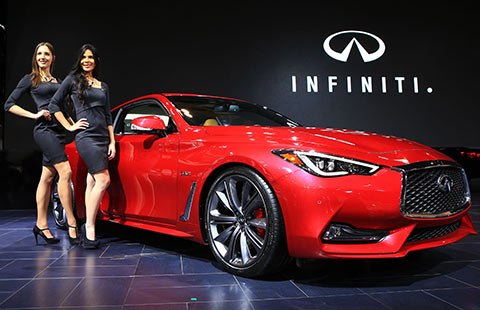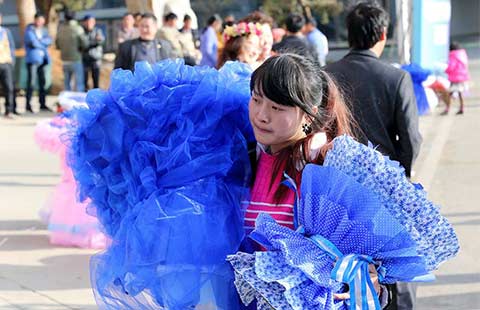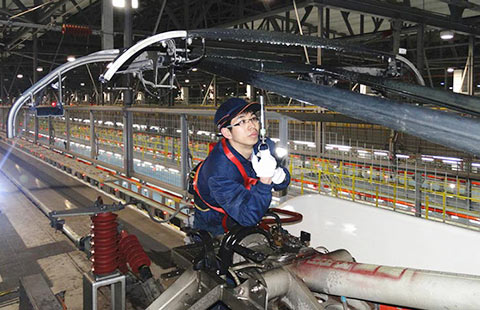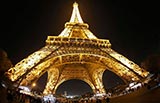Holiday consumption robust amid China's consumer-led growth
(Xinhua) Updated: 2016-02-14 16:23
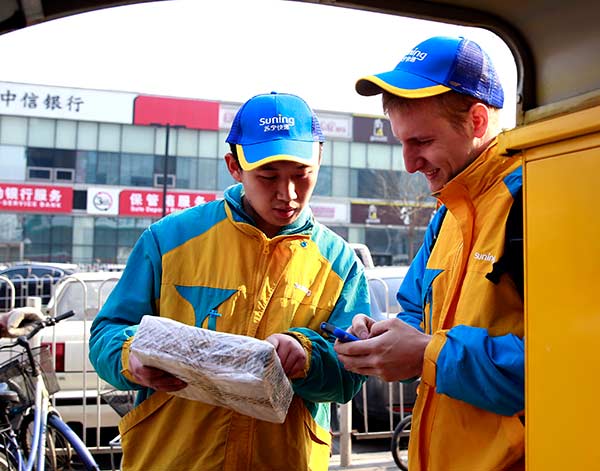 |
|
Samuel Keith (right), 26, from Minnesota in the United States, who is studying Chinese at Peking University in Beijing, takes a customer's phone number from a colleague before delivering a parcel as a part-time express courier for Chinese retail giant Suning.[Photo/China Daily] |
BEIJING -- Booming tourism, cinema and retail sales during the week-long Spring Festival holiday show that China's efforts to make its economy more reliant on the consumption power of its vast population is paying off.
The increasingly affluent Chinese are not only willing to spend, they spend more wisely and healthily. Aside from big feasts during family reunions, activities such as domestic and overseas travel, movies and health products have caught on.
Shops and restaurants across the country brought in 754 billion yuan ($115 billion), up 11.2 percent over the same period last year, the Ministry of Commerce said.
On Feb 8, the first day of the Year of the Monkey according to the lunar calendar, box office reached a record 660 million yuan.
These higher figures did not come from nowhere. Online vendors went full throttle with promotional events and delivery companies worked around the clock.
The Spring Festival is no longer a travel rush characterized by hardship. People now travel comfortably in high-speed trains while the gifts bought online are delivered to their relatives and friends.
Statistics from e-commerce giant Alibaba showed that around 14 percent of orders during its holiday promotion were delivered to different addresses, meaning around 280 million orders were likely holiday gifts.
"A precondition for online vendors to cash in on the holiday is that express delivery companies continued operating thanks to an ample supply of labor. This is an evidence of how fast the Chinese service industry is growing," said Zhao Ping, a researcher with the China Council for the Promotion of International Trade.
Restaurants had a busy week from hosting family dinners. Their business was given added impetus as they worked closer with e-commerce platforms. Sales of 27 restaurants surveyed in the Chongqing Municipality grew 16.6 percent to 8.37 million yuan thanks to cooperation with online platforms including Meituan and Baidu Nuomi.
As income keeps growing, people have become more enthusiastic with other alternatives to celebrate the Chinese New Year. Family gatherings are no longer restricted to hometowns, but have expanded to exotic locales.
Zhang Li, a resident of Shanghai, took her family on a trip to Thailand on Feb 9. "An overseas trip is an attractive option to while away the holiday," she said.
The Chinese are not only more mobile, they travel with more stylish. According to China's leading online travel agent Ctrip, 60 percent of the hotel reservations by Chinese tourist in overseas trips went to four and five-star hotels. The figure for domestic trips was 53 percent. Last year, the figures were 51 percent and 35 percent respectively.
"The preference for better star-rated hotels means Chinese are willing to spend more to ensure enjoyable trips. They have higher demand on quality now," a Ctrip spokesperson said.
The booming holiday market is welcome news for China as it strives to retool its economy from investment-led to one that relies more on consumption and innovation. The economy saw a 6.9-percent growth in 2015, the slowest annual expansion in a quarter century, but consumption has emerged as the new growth driver.
Last year, consumption contributed to 66.4 percent of China's gross domestic product, up 15.4 percentage points from 2014.
- Holiday consumption robust amid China's consumer-led growth
- Spring Festival tourism revenue rises in Beijing
- 86-billion-yuan lock-up shares tradable
- China launches online platform to register fund-raising victims
- Southwest China sees soaring border trade
- Tencent sees record digital red envelope exchange
- Growing service sector bolsters China's economic growth -- economist
- Investment in water projects tops 2 trillion yuan in 5 years
